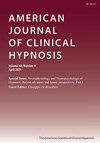临床催眠的目的是智力还是依从性?
IF 1.2
4区 心理学
Q3 PSYCHOLOGY, CLINICAL
引用次数: 1
摘要
世纪之交带来了认知科学的一场小革命。有了令人印象深刻的新技术和方法论,研究人员现在能够系统地观察和测量无意识过程,从而产生了Hassin, Uleman和Bargh(2004)所说的新无意识。虽然一些学者,如Rodolfa和Schaffer(2021),反对“无意识作为一种特定的、可改变的实体存在”的基本假设(第293页),但催眠在没有意识监督(例如,催眠后暗示)的情况下调解目标导向过程的完善使用,暗示了更高认知的参与(即,评估环境和实施目标导向行为)。尽管我们可以将这些自动行为(新颖的、有目的的、与环境相关的)归因于外部操作者的有意识智能(绝对服从),但治疗师能否提供足够的指导来涵盖与复杂生活问题相关的每一种可能的偶然性,这是值得怀疑的。如果专家将智力定义为创造性地使用知识来克服问题(Kaufman, 2013),那么创造性地使用建议来解决问题(没有有意识的参与)是否可以被认为是无意识的智力?这让我们想到米尔顿·埃里克森,他是最早提出催眠的治疗作用不能完全依赖于对暗示的顺从的人之一。相反,埃里克森强调了实现患者行为的内部重新合成(自组织变化)的重要性,这是由患者自己实现的(见Lankton, 2020;短,2021)。催眠的另一个重要创新者,Theodore Sarbin,同样认为催眠的未来取决于将催眠重新定义为一种对话,在这种对话中,患者作为行动的主体参与,而不是作为建议的对象(Sarbin, 1999)。换句话说,智力和内在能动性对个人的成功比顺从更重要。如果要将暗示的使用重新定义为临床催眠的辅助因素,那么我们需要认识并制定作为主要治疗手段的使用策略。更具体地说,催眠能激活不依赖于有意识意图的智能心理操作吗?如果是这样,这种特殊智力的极限是什么?为了在快速发展的认知神经科学和临床心理学领域中解决催眠的相关性问题,我寻求了领先的研究人员和临床医生的帮助,他们分享了他们的观点、研究和应用实践的建议。在本期特刊中,我们收录了五篇关于无意识智能潜力的文章。本讨论从对无意识智力和催眠含义的跨学科文献回顾开始。本文章由计算机程序翻译,如有差异,请以英文原文为准。
The aim of clinical hypnosis—intelligence or compliance?
The turn of the century brought with it a mini-revolution in the cognitive sciences. Equipped with impressive new technology and methodology, researchers are now able to systematically observe and measure unconscious processes, resulting in what Hassin, Uleman, and Bargh (2004) call the New Unconscious. While some scholars, such as Rodolfa and Schaffer (2021), argue against the underlying assumption of “the existence of the unconscious as a specific and modifiable entity” (p. 293), the well-established use of hypnosis to mediate goal-oriented processes, without conscious oversight (e.g., post-hypnotic suggestion), implicates the involvement of higher cognition (i.e., evaluating circumstances and implementing goal-oriented behavior). Though we could attribute these automatic behaviors (that are novel, purposeful, and contextually relevant) to the conscious intelligence of an external operator (absolute compliance), it is doubtful that enough instructions from a therapist could be offered to cover every possible contingency associated with a complex life problem. If experts define intelligence as the creative use of knowledge to overcome problems (Kaufman, 2013), then might the creative use of suggestion to solve problems (without conscious involvement) be recognized as unconscious intelligence? This brings us to Milton Erickson who was one of the first to argue that the therapeutic agency of hypnosis cannot rest entirely on compliance with suggestion. Instead, Erickson emphasized the importance of achieving an inner re-synthesis of the patient’s behavior (self-organizing change) as achieved by the patient him or herself (see Lankton, 2020; Short, 2021a). Another important innovator in hypnosis, Theodore Sarbin, similarly argued that the future of hypnosis depends on redefining hypnosis as a dialogue in which patients participate as agents of their actions, rather than as objects of suggestion (Sarbin, 1999). In other words, intelligence and a sense of internal agency are more crucial to individual thriving than is compliance. If the use of suggestion is to be redefined as an ancillary element in clinical hypnosis, then we need to recognize and develop strategies for use as primary therapeutic devices. More specifically, can hypnosis activate intelligent mental operations that are not dependent on conscious intention? And if so, what are the limits of this special intelligence? To address questions about the relevance of hypnosis within the rapidly evolving fields of cognitive neuroscience and clinical psychology, I enlisted the help of leading researchers and clinicians who have shared their perspectives, research, and recommendations for applied practice. In this special issue, we include five articles addressing the potentials of unconscious intelligence. This discussion begins with a cross-disciplinary review of literature on unconscious intelligence and the implications for hypnosis.
求助全文
通过发布文献求助,成功后即可免费获取论文全文。
去求助
来源期刊

American Journal of Clinical Hypnosis
PSYCHOLOGY, CLINICAL-
CiteScore
2.00
自引率
23.10%
发文量
52
期刊介绍:
The American Journal of Clinical Hypnosis ( AJCH) is the official publication of the American Society of Clinical Hypnosis (ASCH). The Journal publishes original scientific articles and clinical case reports on hypnosis, as well as books reviews and abstracts of the current hypnosis literature. The purview of AJCH articles includes multiple and single case studies, empirical research studies, models of treatment, theories of hypnosis, and occasional special articles pertaining to hypnosis. The membership of ASCH and readership of AJCH includes licensed health care professionals and university faculty in the fields of medicine, psychiatry, clinical social work, clinical psychology, dentistry, counseling, and graduate students in these disciplines. AJCH is unique among other hypnosis journals because its primary emphasis on professional applications of hypnosis.
 求助内容:
求助内容: 应助结果提醒方式:
应助结果提醒方式:


